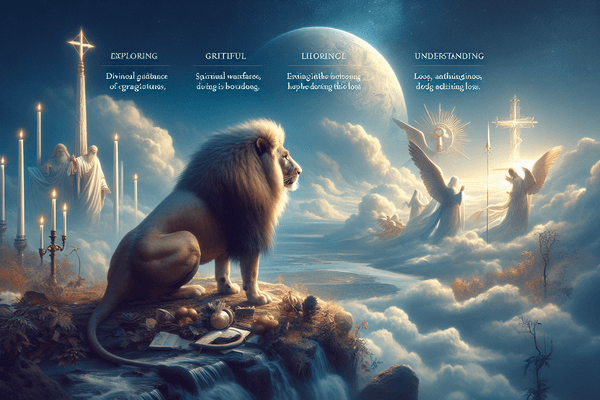Gratitude for Others and Thanksgiving
The apostle Paul's heartfelt exclamation, 'I thank my God every time I remember you' (Philippians 1:3), captures the essence of Christian gratitude. This thankfulness is not limited to moments of joy but extends to all circumstances, as we are urged to 'give thanks in all circumstances; for this is God’s will for you in Christ Jesus' (1 Thessalonians 5:18). Gratitude weaves its way through the fabric of our relationships, binding us together in mutual appreciation and love. It is an acknowledgment of the blessings we receive from others and a recognition of God’s work in our lives, as we are reminded in Colossians 3:15 to 'let the peace of Christ rule in your hearts... and be thankful.' Gratitude, therefore, becomes a transformative force that not only fortifies our faith but also radiates the love of Christ to those around us.
Divine Intervention and Spiritual Warfare
When Daniel received a vision from God, he was given a glimpse into the unseen realm of spiritual warfare. The messenger's words, 'Do not be afraid, Daniel. Since the first day that you set your mind to gain understanding and to humble yourself before your God, your words were heard, and I have come in response to them' (Daniel 10:12-13), assure us that our prayers are not in vain. This narrative reveals that behind the physical world there are spiritual forces at work, as emphasized in Ephesians 6:12, which speaks of our struggle not against flesh and blood but against spiritual forces of evil. Yet, we are comforted by the knowledge that God dispatches His angels to fight for us, reflecting the promise in 1 John 4:4 that 'the one who is in you is greater than the one who is in the world.' These scriptures encourage us to persevere in faith, knowing that divine intervention is at play, even when we cannot see it.
Hope in Times of Loss
In the face of death, the Bible offers a beacon of hope. 'But we do not want you to be uninformed, brothers, about those who are asleep, that you may not grieve as others do who have no hope' (1 Thessalonians 4:13). This promise of the resurrection is a cornerstone of Christian faith, as Jesus proclaimed, 'I am the resurrection and the life. The one who believes in me will live, even though they die' (John 11:25-26). The assurance of being reunited with loved ones in the presence of God brings solace to those in mourning. As we navigate through the valley of grief, scriptures like Revelation 21:4 remind us that God will wipe away every tear, and death will be no more. It is this eternal perspective that lifts the spirits of believers, providing comfort and hope amidst the sorrow of loss.
Jesus as the Lion of Judah
In the book of Revelation, Jesus is revealed as the 'Lion of the tribe of Judah' (Revelation 5:5), a powerful symbol of His royal authority and victorious might. This image harkens back to the blessing of Judah in Genesis, where the patriarch Jacob likened his son to a young lion (Genesis 49:9) and foreshadowed the coming of a ruler. The lion's strength and dominion reflect the messianic role of Jesus as the one who overcomes, giving believers confidence in His ultimate triumph over evil. This majestic portrayal of Christ as both the Lion and the Lamb encapsulates the paradox of His nature—mighty yet meek, sovereign yet sacrificial. As we behold Jesus in His glory, we find hope and strength in His reign, assured that He has conquered and will lead His people to everlasting victory.
Conclusion
Our exploration of biblical themes is more than an academic exercise; it is a journey into the heart of our faith. The messages we find within the pages of Scripture provide us with a compass by which to navigate the complexities of life. From the call to be thankful in all circumstances to the assurance of divine intervention and the comfort found in God’s promises during times of loss, these themes resonate deeply with our spiritual longings. As we reflect upon the majestic portrayal of Christ as the Lion of Judah and the significance of the Sabbath, we are reminded of the richness of our heritage as believers. May these insights inspire us to live out our faith with renewed vigor and to share the hope that dwells within us with a world in need.
FAQ
Q: What is the takeaway message of Daniel’s vision of a messenger?
A: The vision of the messenger in the book of Daniel conveys a message of divine intervention, protection, and deliverance. It emphasizes the ongoing spiritual warfare and reassures us that God hears our prayers and sends His heavenly forces for our protection.
Q: Is Jesus portrayed as a lion?
A: Yes, in the book of Revelation, Jesus is portrayed as the Lion of the tribe of Judah, symbolizing His strength, royalty, and victory over sin and death.
Q: What kind of hope does God give us when a family member dies?
A: God offers hope through the promise of the resurrection and eternal life, assuring us that we will be reunited with our loved ones in His kingdom, as reflected in scriptures such as 1 Thessalonians 4:13 and Revelation 21:4.
Q: When is Jesus portrayed as a lion?
A: Jesus is depicted as the Lion of Judah in Revelation 5:5, emphasizing His messianic authority and triumphant role in God's redemptive plan.






